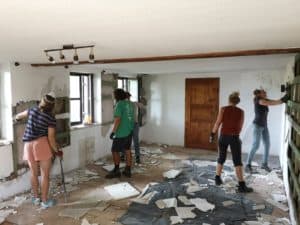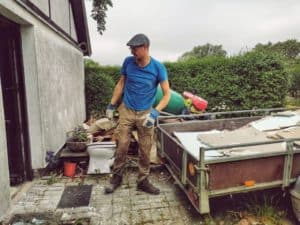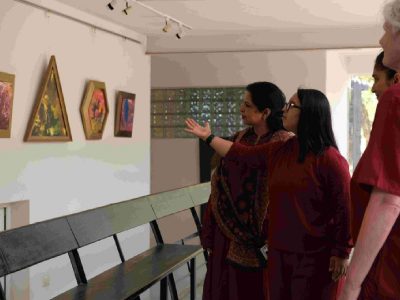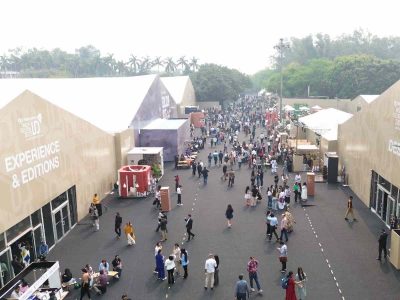During the pandemic, young people in Germany are finding interesting ways to come together, help each other, and in the process, party like never before
The pandemic has changed the way we interact, as each of us is a potential threat to the other. In Europe, after a fairly intense couple of months, the situation is under control. Health experts, however, warn of a second spate of Covid-19 cases.

Germany, which is one the most successful countries in tackling the pandemic, initially focused on refurbishing the health infrastructure–which was fairly good to begin with–to meet any eventualities. Having done that, restrictions on domestic travel, also within the European Union (EU), were eased. Only people flying in from outside of Europe are required to undergo the mandatory two-week quarantine.
With the advent of summer, when people like to be outdoors, travelling to beaches, camping along a pristine lake, hiking, cycling long distances, the situation became a bit tricky given there are still hundreds of active cases in the country. Summer, in this part of the world, is to celebrate the warm sun after a protracted grey winter. This was all possible, but people had to follow certain conditions.
However, the much-awaited annual events–like the music, art or even the beer festivals–involving large gatherings, sometimes over a weekend, will not be taking place this year.
These events are seen as a great opportunity to take a break from routine life and get wild–alcohol, music, dance and even drugs. Over the years, they have become very popular, attracting hundreds and thousands of bohemian-minded people who otherwise lead a fairly tame life due to the force of circumstance and the need to make a decent living.

Europeans are missing these events. As they say, necessity is the mother of invention. And folks are finding innovative ways to celebrate with friends–as even the most non-conformist people feel responsible for their civic duties.
In the Northeastern tip of Germany, Greifswald, a small university town nestled on the coast of Baltic Sea, was the venue for an interesting weekend of celebration with friends, in a unique and purposeful way.
Jan Peters, managing the affairs of an environmental NGO, along with two other friends, recently purchased a cottage by the sea, some 15 km from the city. A marshy patch of land with tall grass separates the cottage from with the backwaters that open into the Baltic Sea. It’s a dream house in a dream location–almost surreal–out of a painting.
The cottage, however, was in a state of disrepair. Jan and the other two co-owners invited some 30 friends for a party with a purpose, that started on Saturday morning and lasted till Sunday afternoon.
They were invited to help in a task while partying. They had to tear up the old false ceiling, pull down the wooden partitions and drill out panels from the wall. Moreover, they had to dig up the old tiles from walls and floors. And after having done that, dispose of the huge amount of rubble and tidy up.

Once this process is over, the cottage will be ready for a makeover which will be carried out by professionals. This task would have taken weeks to perform by the three owners of the cottage but was accomplished by friends over a weekend. And the pounding, striking and drilling is a good way to vent pent-up emotions.
In return, Jan opened the gates of his garden, with cushy grass, punctuated by trees swaying in the winds blowing from across the bay on a warm sunny day. Not just that, he organised food and drinks for them. A Volkswagen Van, owned by a friend, hollow from inside, able to accommodate half a dozen dancing souls, with a built-in stereo system, provided the pulsating music and added to the fun atmosphere.
“It was not a commitment or obligation, people were here to enjoy,” explains Jan. People worked and took breaks whenever they wanted, as long as they wanted. Some ran across the green fields in small groups, ridding themselves of clothes, to take a plunge and swim naked in the cool deep blue water. There were others lying on the grass, face up, eyes closed, hands folded over their chest, soaking in the sun. A group of people sat on the grass in a big circle, sipping beer and wine from paper glasses, savouring food from a tin plate, enjoying casual conversations.
After sundown, people were seen carousing around a bonfire for long…almost till dawn. Hardly anyone slept but for the occasional naps in the sun. “It was wonderful. People were happy,” Jan affirms.
In a similar spirit, a group of young people decided to help an old lady, a retired teacher, of 80 years–though in the pink of health–in a neighbourhood in Berlin. She had posted a bill in the local departmental store a month ago, seeking paid help to paint the interior of her house. There was no response. So five gals and lads residing in the same building knocked on her door on a Friday evening. They offered to help her out over the weekend–free of cost as a goodwill gesture. She just had to provide the materials. They did a great job. She was overwhelmed by their kindness and invited them for a barbeque on Sunday evening. And as a parting gift, gave them a two-litre bottle of single malt.
“It was a 19-year-old scotch my late husband brought 20 years ago,” she said and added, “I’m a private person and don’t like to be named,” she insisted. But she was happy to share the names of her good samaritans–George, Hella, Mia, Marie and Finn. Finn is also a former student. “I miss my grandmother and helping her was so satisfying. I think younger people should take care of the older folks–not as a favour–but because they are interesting people and good company,” Finn says over a short Skype conversation.
Finn, 29, engineer, is an easy-going guy. He’s tall and lanky with blue expressive eyes set on a conical face, looking forward to visiting friends in Hamburg. He asks, “Who says work and pleasure don’t go hand in hand? Sometimes work to help is a good way to enjoy a holiday.”
(Cover: Friends enjoying in the garden)





